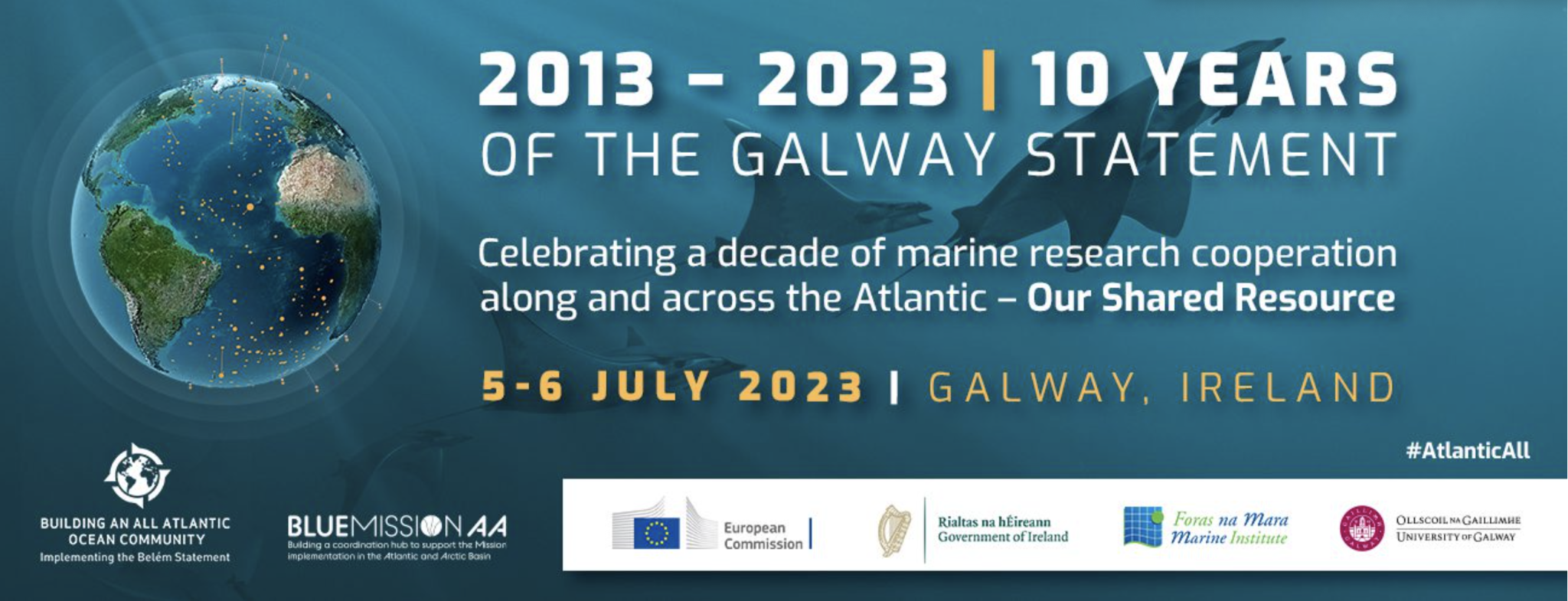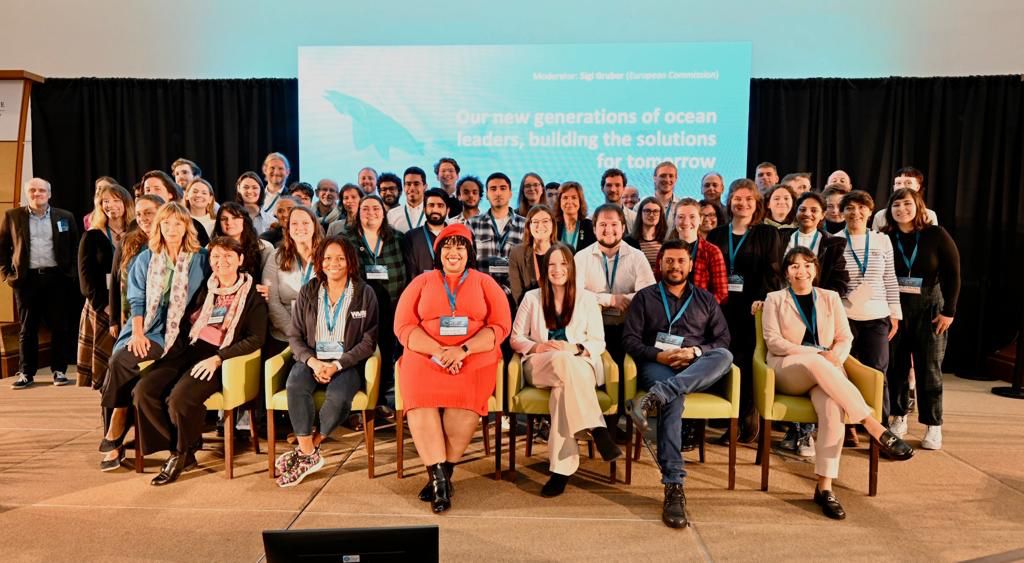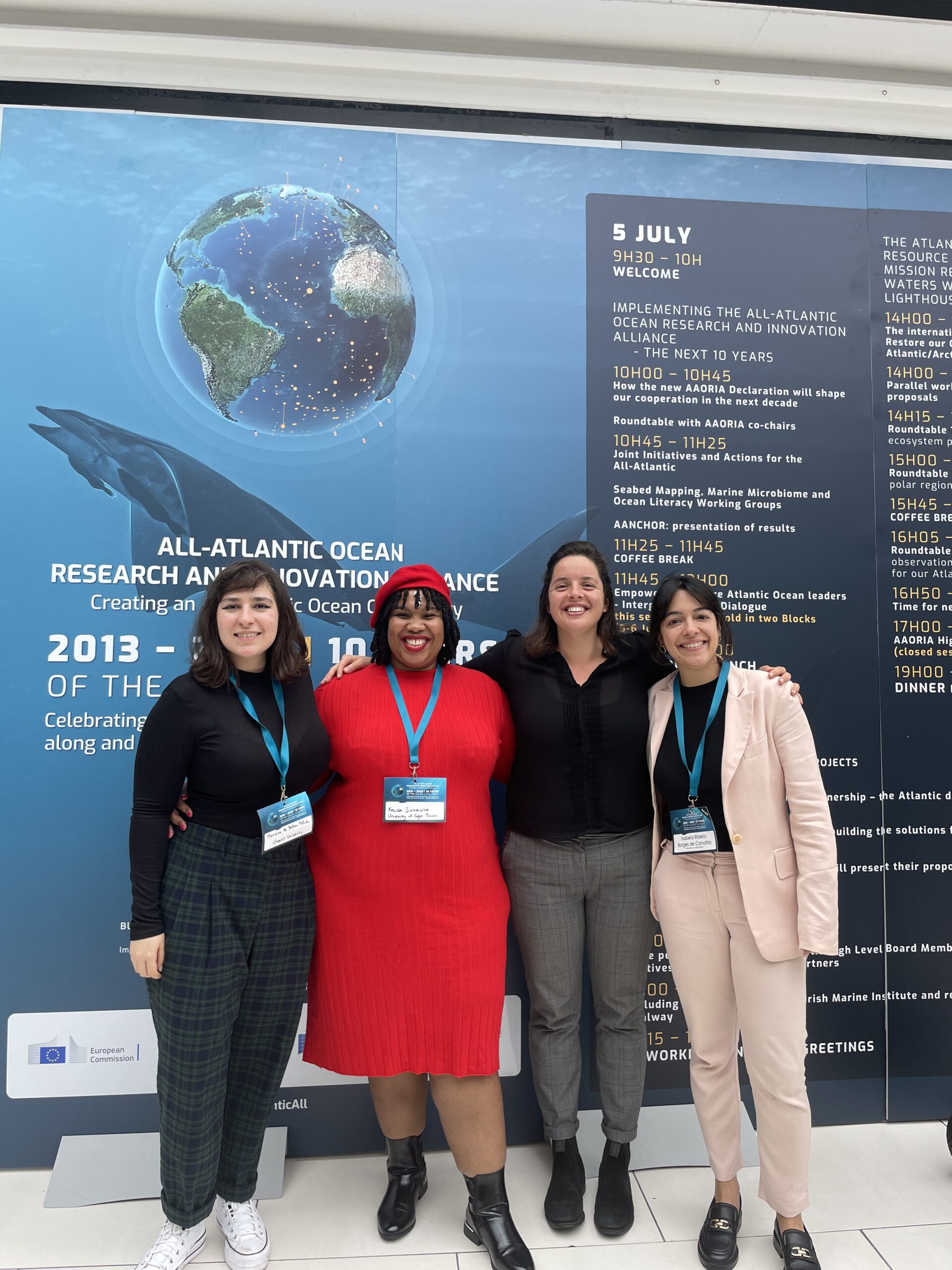
High-level officials, ocean researchers, policymakers and other stakeholders, including Early Career Ocean Professionals (ECOPs) gathered in Galway, Ireland from 5 to 6 July 2023 to commemorate 10 years of the Galway Statement. A pivotal agreement signed in 2013 by Canada, the United States of America, and the European Union, the Galway Statement set forth a roadmap for a future of unprecedented ocean research cooperation and knowledge-sharing among countries bordering the Atlantic Ocean.
Organised by the All-Atlantic Ocean Research and Innovation Alliance in collaboration with the Irish Government, the European Commission, the Marine Institute, and the University of Galway, the event, “2013 – 2023: 10 years of the Galway Statement. Celebrating a decade of marine research cooperation along and across the Atlantic Ocean – Our Shared Resource“, celebrated and highlighted a decade of achievements in ocean research. The event also emphasised essential role of international collaborations in addressing global challenges affecting the Atlantic Ocean.
The Galway Statement – an ocean of collaboration
The Galway Statement aimed to foster a deeper collective understanding of the ocean’s challenges and opportunities. Its signing encouraged a joint effort in addressing pressing issues related to climate change, marine biodiversity, marine pollution, sustainable fisheries, and seabed mapping. The momentous agreement has since served as a catalyst for international collaboration, particularly within ocean observation. In the last decade, over 1,000 research teams have been propelled to embark on ambitious data-driven expeditions that have helped reveal the urgent need for conservation and sustainable ocean management within the Atlantic.
Throughout the duration of the celebratory event, tangible and impactful examples of collaborative achievements and projects were showcased. From concerted efforts to map the seabed and better understand the science of marine microbiome to ocean observation tools for better ecosystem-based management. The sharing of research infrastructures among Atlantic partners has facilitated interdisciplinary collaboration, enabling scientists to address complex ocean challenges from multiple perspectives.
These international collaborations and pursuits in science diplomacy today form the international and research pillar of the EU Atlantic Strategy. Since the signing of the Galway Statement, over €300 million have been invested in projects that seek to promote and foster collaborations between Europe and scientists from across the Atlantic. It is through these endeavours that historic missions, such as the “Mission Restore our Ocean and Waters by 2030”, and its initiatives “Atlantic and Arctic lighthouse”, and “Sustainable Blue Economy Partnerships” have since been launched. Together, these activities highlight and emphasise the EU and its Atlantic partner’s commitment to the UN Sustainable Development Agenda 2030. European Commission press release, 4 July 2023

Harnessing the power of Ocean Observations
Through the showcasing of the collaborative achievements, the event highlighted the vital role of ocean observation in addressing global challenges within the Atlantic. Since the signing of the Galway Statement and subsequent agreements, including the Belem Statement, significant advancements in ocean observation technologies and data-sharing mechanisms have taken place. These advancements have played a pivotal role in understanding the effects of climate change on the ocean’s health, guiding policies for marine ecosystem protection, combating plastic pollution, and supporting sustainable fisheries and other blue economy activities.
On the afternoon of the 5th July, inspiring roundtable discussions emphasised how continuous ocean observations, enabled through satellite and in situ technology, and ocean modelling, provide unparalleled insight into understanding ocean dynamics, biodiversity, and climate change impacts in the whole Atlantic region. EU funded projects such as Mission Atlantic, SO-CHIC, and organisations including Mercator Ocean International, implementer of the EU Copernicus Marine Service, and the Ocean Frontier Institute participated in the discussion, highlighting their projects and services. From the depths of the ocean to the coastlines, the data collected and derived services and products have become the foundation for shaping evidence-based policymaking, driving efforts to safeguard the delicate ecosystems of the Atlantic for future generations.

Empowering new Ocean Stewards
As the event looked back on 10 years of progress, it also set its sights on the future, with a key focus on Early Career Ocean Professionals (ECOPs) in shaping the future of ocean research innovation and policy making. The EU4OceanObs project supported the participation of four ECOPs from South Africa, Mexico, Portugal and Brazil at this event.
Inter-generational dialogues, in the form of hybrid groups, between experienced leaders and emerging talents were conducted throughout the first afternoon. The dialogues fostered conversations and innovative thinking in how to tackle shared ocean conservation priorities, including; 1) implications of climate change for the ocean and the polar regions; 2) Protecting and restoring marine ecosystems and biodiversity; 3) Addressing marine plastic pollution; 4) Supporting sustainable fisheries and aquaculture; 5) Coordinating Atlantic observations and seabed mapping efforts.
The objective was to develop a short “presentation to parliament” with concrete avenues for collaborative action to address these five priorities. The active participation of ECOPs allowed for the exchange of innovative ideas and perspectives on how science and the scientific community can better contribute to policymaking and foster pragmatic approaches to ocean stewardship.
The initiative was praised by participating ECOPs for its networking and knowledge exchange potential.
“I loved the ECOPs mock parliament for its networking opportunity. It gave us the ability to pick each others brains as diverse scientist from different backgrounds and countries, to share ideas and learn from each other and see how other researchers on the other side of the Atlantic think, how they implement their solutions and solve their challenges. It was also empowering to see that we are not alone in the challenges we face, especially in the global south,” said Kolisa Sinyanya, an ECOP based at the University of Cape Town, South Africa.
The involvement of ECOPs brought new energy and ideas and demonstrated the innovation that they bring to the table. Each group proposed inspiring ideas, including a “EU-topia” bill addressing climate change and empowering polar communities; developing a forum where ECOPs can follow policy-making procedure and come together to collectively challenge policies with negative impacts on biodiversity, sharing experiences and expertise; as well as establishing a network where research groups, existing initiatives, communities, and stakeholders can come together to support policy reform, regulations, knowledge sharing and networking to collectively tackle plastic pollution issues; to the creation of operative and inter-connected living labs that could facilitate knowledge sharing and capacity building within local communities and indigenous groups to promote sustainable aquaculture; and leverage the All-Atlantic multinational network to devise a focused seabed mapping effort that can address the data gaps and establish the ecological importance of the seabed.
The session illustrated how ECOPs can act as bridges between the scientific community and policymakers. Through their proposed solutions, the ECOPs emphasised the critical importance of creating networks and forums for knowledge exchange and collaboration. Their overarching request was for continuous engagement and participation of young professionals in shaping ocean policies and sustainability efforts.
Today’s ECOPs represent a new generation of scientists, researchers, and innovators who will be at the forefront of marine research and conservation in the future. Their engagement and empowerment are vital for the continuity of efforts to understand and protect the Atlantic Ocean. Their active involvement in research and policy discussions will, consequently, ensure that scientific findings are translated into actionable policies and conservation measures, becoming the vanguards of change.
“As an ECOP myself, I recognize that our collective actions will influence the future of our oceans. Engaging in initiatives like these, empowers us to envision impactful solutions for the challenges the Atlantic Ocean faces.” – Mafalda de Freitas, Peniche Watch, Portugal
Shaping the future
The Galway Statement’s 10th anniversary event was a celebration of unity, knowledge, and a mutual vision for the future of the Atlantic Ocean – a shared global resource.
The coordinated approach among Atlantic partners has empowered the development of joint research roadmaps and fostered a comprehensive understanding of the Atlantic Ocean’s dynamics and ecosystems. The ongoing development of digital twins of the ocean, will improve the monitoring and forecasting capabilities, allow us to explore desirable futures, assess and test ocean management scenarios, and assemble twin applications to find the effective solutions to protect our oceans and seas and use their resources in a sustainable and responsible way. Moreover, the commitments made through the Galway Statement, and those subsequent, have contributed to tangible outcomes, such as the establishment of new Marine Protected Areas, the implementation of sustainable fisheries practices, and the reduction of plastic pollution along the Atlantic coastline.
The celebration of the 10th Anniversary served as a platform to recognise the achievements and progress made since the signing of the Galway Statement. However, it also served as a platform to reinforce collaborative partnerships among Atlantic countries, research institutions, and stakeholders. Groups that are working together to promote sustainable ocean stewardship and to leverage the power of ocean observation in tackling global challenges. The array of participating members presented an inspiring setting for many participating early career scientists.
“I loved how this was an organization of various countries coming together for the same objective, talking about common topics, goals and challenges,” stated Isabela, an ECOP based at the University of Sao Paulo, Brazil.
The event’s inclusion of intergenerational dialogues also emphasized the importance of involving young professionals in shaping the future of ocean research and conservation, ensuring a more sustainable and resilient future for the Atlantic Ocean and its ecosystems. Many ECOPs expressed their hope to see greater levels of inclusion going forward.
“I would love to see even more inclusion and representation of ECOPs and other cultures and ethnicities within this space” emphasised Mariana, an ECOP from Mexico, currently based at the University of Utrecht, Netherlands.
As the event concluded, participants discussed prospects and priorities for the next decade of marine research cooperation in the Atlantic. These included the need for increased investments in ocean research, shared infrastructure, and cutting-edge technology to build upon past achievements, resolve data gaps, and confront emerging environmental threats. Overall, underscoring the significance of continued collaboration and knowledge sharing in confronting the challenges faced by the Atlantic Ocean.
The next decade of marine research cooperation and ocean observation in the Atlantic Ocean holds great promise for advancing sustainable development and supporting global initiatives such as the UN Decade of Ocean Science for Sustainable Development. Through strengthened partnerships, shared research infrastructures, technological innovation, and increased public engagement, further outcomes of the Galway Statement will play a pivotal role in safeguarding the Atlantic Ocean’s rich biodiversity, contributing to a resilient and thriving Atlantic Ocean and protecting coastal communities.
Article by Mafalda de Freitas, Peniche Watch, Portugal
Useful links
- All-Atlantic Ocean Research and Innovation Alliance – 10 years of the Galway Statement
- Recordings of the event:
- Day 1: https://vimeo.com/840891845/6c672a6fc0?share=copy
- Day 2: https://vimeo.com/842548477/689ca28840?share=copy
- Galway Statement anniversary: a decade of marine research cooperation along and across the Atlantic Ocean – https://ec.europa.eu/commission/presscorner/detail/en/ip_23_3663
- EU Atlantic Strategy
- All-Atlantic Ocean Research and Innovation Alliance





